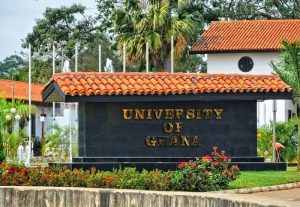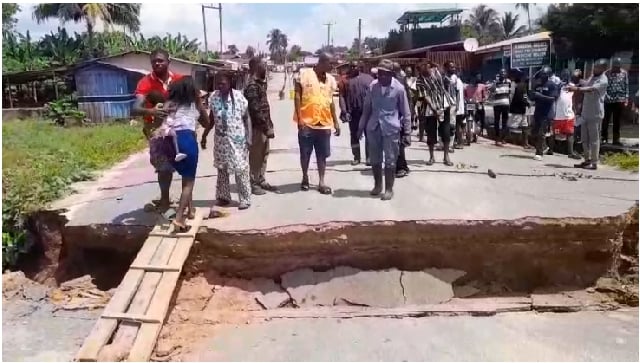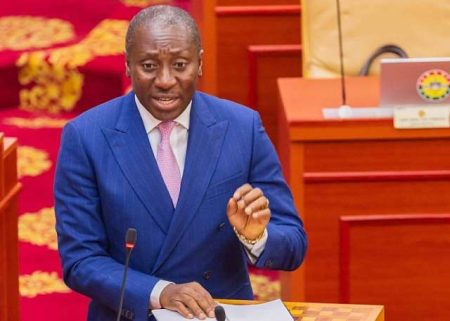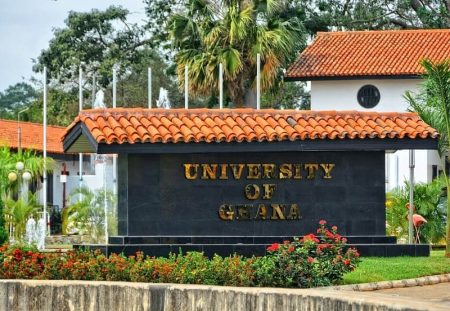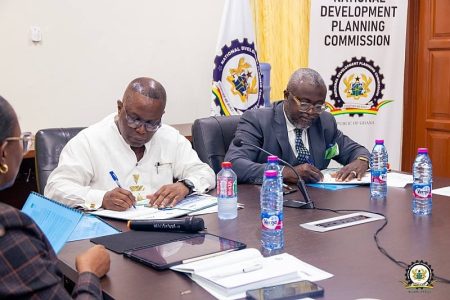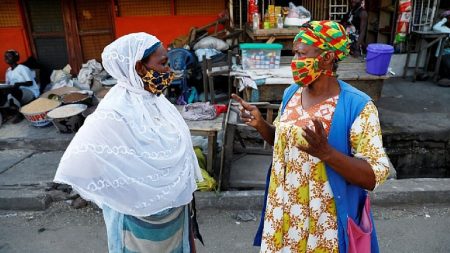The collapse of a crucial bridge in Amanase, a farming community nestled within the Ayensuano District of Ghana’s Eastern Region, has plunged the area into isolation and severely disrupted the lives of its residents. The bridge, which served as the sole direct link between Amanase and the neighboring Aboabo township, succumbed to the force of heavy rainfall on a Tuesday evening, leaving the community stranded and cut off from essential services. The resulting floodwaters have rendered the river crossing treacherous, posing a significant risk to residents, particularly women and schoolchildren who rely on the route for their daily activities. The incident underscores the vulnerability of rural communities to infrastructural failures and the urgent need for proactive maintenance and investment in vital infrastructure.
The collapse of the Amanase bridge has had a cascading effect on the community’s socioeconomic fabric. Access to education, healthcare, and markets has been severely hampered, placing a strain on the daily routines of residents. Schoolchildren face difficulties reaching their schools, hindering their access to education and potentially impacting their academic progress. The ability to seek medical attention at healthcare facilities has also been compromised, raising concerns about the community’s well-being and access to timely medical interventions. Furthermore, the bridge’s collapse has disrupted market access, hindering the ability of farmers to transport their produce and sell their goods, threatening their livelihoods and the local economy. The situation highlights the interconnectedness of infrastructure and community well-being, demonstrating how a single point of failure can disrupt multiple aspects of daily life.
The District Chief Executive (DCE) for Ayensuano, Joshua Yaw Frederick Lartey, expressed his deep disappointment and frustration over the bridge’s collapse, attributing it to years of neglect and unheeded warnings. He lamented the lack of action despite repeated concerns raised about the bridge’s deteriorating condition, emphasizing that the community is now bearing the brunt of this inaction. His statement underscores the importance of proactive infrastructure maintenance and the need for timely responses to prevent such critical failures. The DCE’s appeal to the government, the Eastern Regional Minister, and other relevant agencies for immediate intervention reflects the urgency of the situation and the need for a swift and effective response to restore connectivity and alleviate the community’s hardship.
The Assembly Member for Amanase, who also serves as the NADMO Director for Ayensuano, echoed the DCE’s call for urgent action, emphasizing the bridge’s critical role in the community’s survival and access to essential services. He highlighted the impact on education, healthcare, and overall well-being, stressing that the situation transcends mere inconvenience and poses a threat to the community’s fundamental needs. His plea underscores the urgency of the situation and the need for a swift response to mitigate the impact on the community.
The residents of Amanase now find themselves in a precarious situation, their daily lives disrupted and their access to essential services severely limited. The collapse of the bridge has brought into sharp focus the vital role infrastructure plays in connecting communities and enabling access to opportunities. The incident serves as a stark reminder of the consequences of neglecting infrastructure maintenance and the need for proactive measures to ensure the safety and well-being of communities.
The Amanase bridge collapse serves as a case study highlighting the challenges faced by many rural communities in accessing essential services. The incident underscores the importance of investing in robust and resilient infrastructure, implementing regular maintenance programs, and establishing effective response mechanisms to address infrastructure failures promptly. The community’s plight calls for a concerted effort from government agencies, local authorities, and relevant stakeholders to prioritize infrastructure development and maintenance to ensure that communities like Amanase are not left isolated and vulnerable. The situation demands a proactive approach to infrastructure management, moving beyond reactive responses to prevent similar incidents from occurring in the future.



